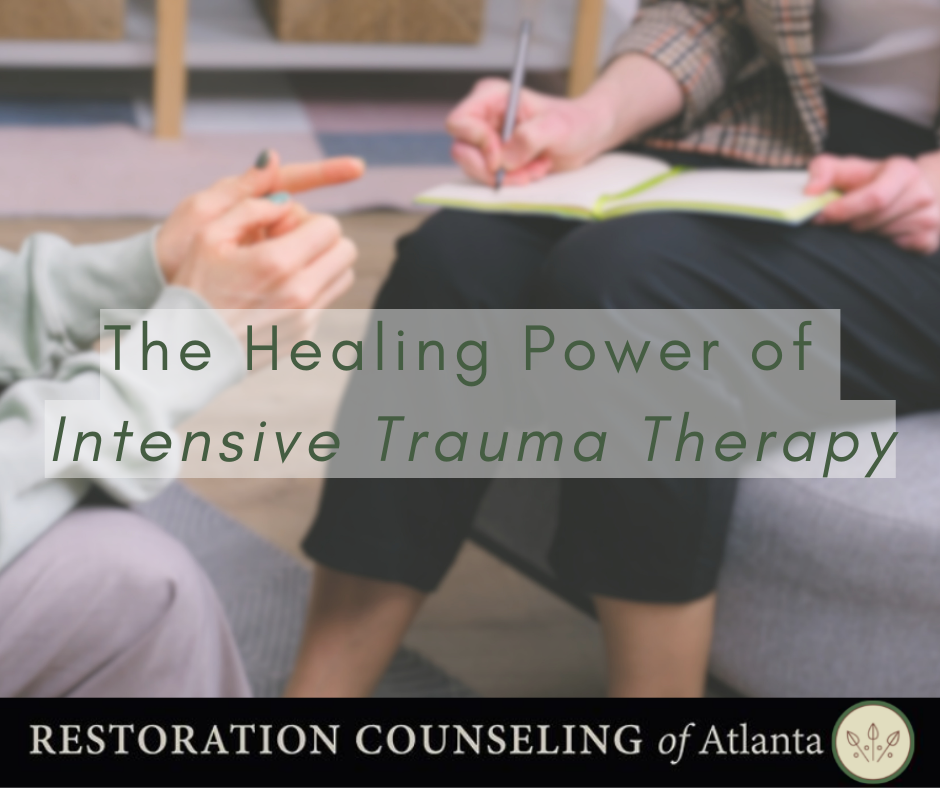You have been on your therapy journey for a while and feel okay, but life could be better. You and your therapist have identified areas that you feel stuck in, and you want to break through those. Intensive trauma therapy may be a good fit for you!
Understanding Intensive Trauma Therapy
Intensive trauma therapy is often conducted in concentrated and extended sessions over a short period of time. It aims to provide individuals with a more immersive and comprehensive healing experience. Unlike traditional weekly therapy sessions that can extend over months or even years, intensives offer a highly focused approach that compresses the therapy process into a matter of days or weeks. Let’s take a closer look at the research evidence that highlights the effectiveness of intensive trauma therapy.
Rapid Reduction in Symptoms
A growing body of research has shown that intensive trauma therapy can lead to rapid reductions in symptoms associated with trauma-related disorders. A study published in the “Journal of Anxiety, Stress & Coping” (2003) found that individuals who participated in an intensive EMDR (Eye Movement Desensitization and Reprocessing) therapy program experienced significant decreases in symptoms of post-traumatic stress disorder (PTSD) over a shorter period compared to traditional therapy methods.
Improved Treatment Engagement and Retention
Research published in the “Journal of Traumatic Stress” (2009) revealed that individuals who engaged in intensive trauma therapy were likelier to complete their treatment than those receiving standard weekly therapy sessions. This suggests that the condensed format of intensives may enhance treatment engagement and retention, facilitating faster progress.
Enhanced Emotional Processing
A study conducted by Van Den Hout and colleagues (2012) and published in “Behavior Research and Therapy” demonstrated that intensive exposure therapy for PTSD led to improved emotional processing and reduced intrusive memories. Participants in the intensive therapy group reported significantly lower distress levels after a shorter duration of treatment.
Comparable Efficacy to Standard Therapy
A comprehensive meta-analysis published in the “Journal of Traumatic Stress” (2015) examined the effectiveness of intensive trauma therapy compared to standard therapy for PTSD. The results showed that intensives were equally effective in reducing PTSD symptoms. This suggests that this accelerated approach does not compromise treatment outcomes.
Improved Quality of Life
Beyond symptom reduction, research published in the “Journal of Anxiety and Depression” (2020) found that intensive trauma therapy improved overall quality of life, including emotional and social well-being. This indicates that intensives may not only accelerate healing but also contribute to higher overall life satisfaction. The research evidence supporting intensive trauma therapy as an effective way to help individuals process trauma acceleratedly is compelling. From rapid symptom reduction to improved treatment engagement and enhanced emotional processing, intensive therapy formats have shown promise in the field of trauma treatment.
Are Intensives a Good Fit for Me?
Intensives are not for everyone! The results may vary from person to person, depending on their individual needs and circumstances. They may be a good fit for you, IF:
- You wish for more time and space for deep, intentional work than a 45-60 minute therapy session allows.
- You have an upcoming milestone or transition (a wedding, moving states, a new job, or becoming a parent), and you want an effective way to do concentrated work in less time.
- You have done EMDR and wish you had more time to reprocess and tackle more targets in one sitting.
EMDR Intensives combine the evidence-based, highly effective power of EMDR with the space and personalized care to maximize your healing.
Micah is currently accepting clients for intensives. If are curious about whether intensives are right for you, reach out to Micah at micah@restorationcounselingatl.com.
Written by: Rebeca Gilbert

